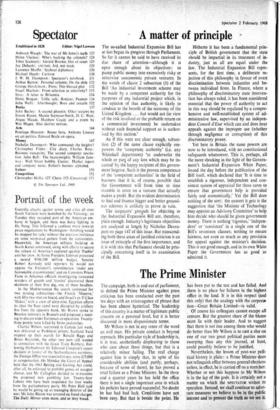- A matter of principle -
The so-called Industrial Expansion Bill has at last begun its progress through Parliament. So far it cannot be said to have received its due share of attention—although it is open enough about its objectives: to pump public money into excessively risky or otherwise uneconomic private ventures. In the words of clause 2 subsection (1) of the Bill 'An industrial investment scheme may be made by a competent authority for the purposes of any industrial project which, in the opinion of that authority, is likely to conduce to the benefit of the economy of the United Kingdom . . . but would not (in view of the risk involved or the probable return on a commercial investment) be undertaken without such financial support as is author- ised by this section.'
As if this were not clear enough, subsec- tion (2) of the same clause explicitly em- powers the 'competent authority' (i.e. any Whitehall department) `to underwrite the whole or pall of any loss which may be in- curved' by the happy recipient of this govern- ment largesse. Such is the proven competence of the 'competent authorities' in the field of business that it is, of course, possible that the Government will from time to time stumble in error on a venture that actually makes a profit. But the evident determination to find and finance bigger and better ground- nut schemes is unlikely to prove in vain.
The taxpayers' groupds for objecting to the Industrial Expansion Bill are, therefore, plain enough. Industry's legitimate objections are analysed at length by Nicholas Daven- port on page 147 of this issue. But transcend- ing both these areas of justified criticism is an issue of principle of the first importance, and it is with this that Parliament should be prin- cipally concerning itself in its examination of the Bill. Hitherto it has been a fundamental prin- ciple of British government that the state should be impartial in its treatment of in- dustry, just as all are equal under the law. The Industrial Expansion Bill repre- sents, for the first time, a deliberate re- jection of this philosophy in favour of overt discrimination between industries and be- tween individual firms. In France, where a philosophy of discriminatory state interven- tion has always ruled, it has been considered essential that the power of authority to act in this way should be regulated by a compre- hensive and well-established system of ad- ministrative law, supervised by an indepen- dent Conseil Etat which can and does hear appeals against the improper use (whether through negligence or corruption) of this discriminatory power.
Yet here in Britain the same powers are now to be introduced, with no constitutional safeguards whatsoever. This is, perhaps, all the more shocking in the light of the Govern- ment's Industrial Expansion White Paper, issued the day before the publication of the Bill itself, which declared that 'It is time to establish a rigorous, independent and con- sistent system of appraisal for these cases to ensure that government help is provided fairly and economically.' Yet the Bill does nothing of the sort: the nearest it gets is the suggestion that 'the Minister of Technology may appoint an Advisory Committee' to help him decide who should be given government money. There is nothing 'rigorous,' 'indepen- dent' or 'consistent' in a single one of the Bill's seventeen clauses; nothing to ensure fairness, not even so much as any provision for appeal against the minister's decision. This is not good enough, and in its own White Paper the Government has as good as admitted it.


































 Previous page
Previous page